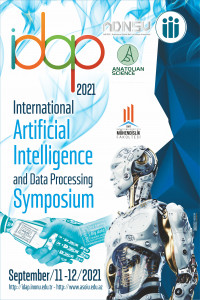Abstract
Identification of trusted users or information source in social networks is one of the most important needs for reasons such as data security and privacy. In this study, the social network is modeled as a graph. Trusted and untrusted individuals in the network have been determined with the principle that if the nodes have common neighbors, these nodes are similar. Thanks to this determination, it has been possible to ensure the security of the network and to strengthen the ties with the trusted structures by taking the necessary measures for the untrustworthy structures in the network with the predicted confidence inferences.
Keywords
References
- Alp, S. (2007). Türkiye’de eğitim sürecinin Markov geçiş modeli. 8. Türkiye Ekonometri ve İstatistik Kongresi, 24-25.
- Biggs, N., Lloyd, E. K., & Wilson, R. J. (1986). Graph Theory, 1736-1936. Oxford University Press.
- Boy, O. (2012). Sosyal ağlarda topluluk yapılarının analizi (Master's thesis, İnönü Üniversitesi Fen Bilimleri Enstitüsü).
- Bruhn, M., Schoenmueller, V., & Schäfer, D. B. (2012). Are social media replacing traditional media in terms of brand equity creation?. Management research review.
- Even, S. (2011). Graph algorithms. Cambridge University Press.
- Fortunato, S. (2010). Community detection in graphs. Physics reports, 486(3-5), 75-174.
- Goyal, R., Upadhyay, A. K., Sharma, S., & Mishra, P. K. (2020). Analysis of Predicting Trust in Complex Online Social Networks. Materials Today: Proceedings, 29, 573-580.
- Herman, I., Melançon, G., & Marshall, M. S. (2000). Graph visualization and navigation in information visualization: A survey. IEEE Transactions on visualization and computer graphics, 6(1), 24-43.
- Karadeniz, E., TEMEL, M. M., & KARCI, A. (2018, September). Prediction of Collaboration Between Universities of Turkey. In 2018 International Conference on Artificial Intelligence and Data Processing (IDAP) (pp. 1-4). IEEE.
- Karlin, S. (2014). A first course in stochastic processes. Academic press.
- Mayadunna, H., & Rupasinghe, L. (2018, October). A trust evaluation model for online social networks. In 2018 National Information Technology Conference (NITC) (pp. 1-6). IEEE.
Abstract
Sosyal ağlarda güvenilir kullanıcılar veya bilgi kaynağının tespiti, bilgilerin güvenliği ve gizliliği nedeniyle birincil gereksinimlerden biridir. Bu çalışmada sosyal ağ bir çizge olarak modellenmiştir. Ağdaki güvenilir ve güvenilmeyen bireyler, düğümlerin ortak komşuları varsa bu düğümler benzerdir ilkesiyle belirlenmiştir. Bu tespit sayesinde öngörülen güven çıkarımları ile ağdaki güvenilmez yapılar için gerekli tedbirler alınarak ağın güvenliğinin sağlanmasına ve güvenilen yapılarla bağların kuvvetlendirilmesine imkan tanınmıştır.
Keywords
References
- Alp, S. (2007). Türkiye’de eğitim sürecinin Markov geçiş modeli. 8. Türkiye Ekonometri ve İstatistik Kongresi, 24-25.
- Biggs, N., Lloyd, E. K., & Wilson, R. J. (1986). Graph Theory, 1736-1936. Oxford University Press.
- Boy, O. (2012). Sosyal ağlarda topluluk yapılarının analizi (Master's thesis, İnönü Üniversitesi Fen Bilimleri Enstitüsü).
- Bruhn, M., Schoenmueller, V., & Schäfer, D. B. (2012). Are social media replacing traditional media in terms of brand equity creation?. Management research review.
- Even, S. (2011). Graph algorithms. Cambridge University Press.
- Fortunato, S. (2010). Community detection in graphs. Physics reports, 486(3-5), 75-174.
- Goyal, R., Upadhyay, A. K., Sharma, S., & Mishra, P. K. (2020). Analysis of Predicting Trust in Complex Online Social Networks. Materials Today: Proceedings, 29, 573-580.
- Herman, I., Melançon, G., & Marshall, M. S. (2000). Graph visualization and navigation in information visualization: A survey. IEEE Transactions on visualization and computer graphics, 6(1), 24-43.
- Karadeniz, E., TEMEL, M. M., & KARCI, A. (2018, September). Prediction of Collaboration Between Universities of Turkey. In 2018 International Conference on Artificial Intelligence and Data Processing (IDAP) (pp. 1-4). IEEE.
- Karlin, S. (2014). A first course in stochastic processes. Academic press.
- Mayadunna, H., & Rupasinghe, L. (2018, October). A trust evaluation model for online social networks. In 2018 National Information Technology Conference (NITC) (pp. 1-6). IEEE.
Details
| Primary Language | Turkish |
|---|---|
| Subjects | Computer Software |
| Journal Section | PAPERS |
| Authors | |
| Publication Date | October 20, 2021 |
| Submission Date | September 3, 2021 |
| Acceptance Date | September 16, 2021 |
| Published in Issue | Year 2021 Volume: IDAP-2021 : 5th International Artificial Intelligence and Data Processing symposium Issue: Special |
The Creative Commons Attribution 4.0 International License
is applied to all research papers published by JCS and
A Digital Object Identifier (DOI)  is assigned for each published paper.
is assigned for each published paper.

